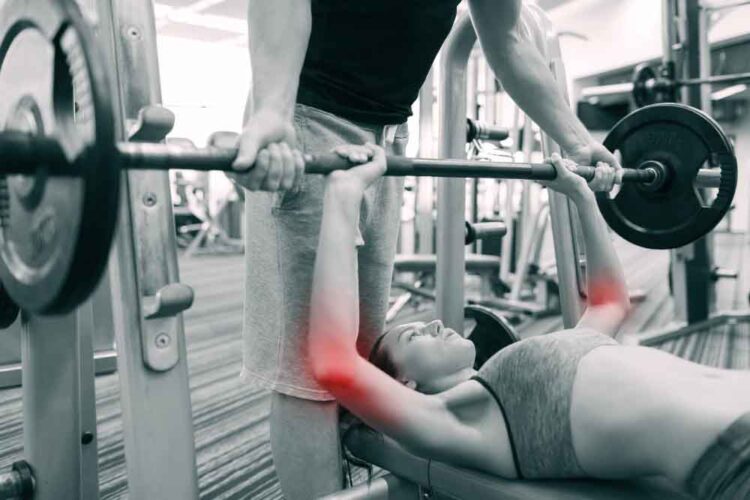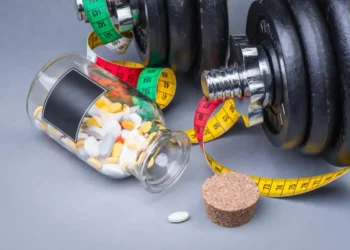Did you know that making sure your muscles recover well is just as important as working out? If you don’t focus on recovery, your gains might slow down and you could get hurt more easily. It doesn’t matter if you’re into sports or just love working out, learning how to recover properly is key. It helps you perform better and reach your fitness goals safely.
Key Takeaways:
- Proper muscle recovery is vital for maximizing your fitness gains and reducing the risk of injuries.
- Understanding the best practices for muscle recovery can help optimize your performance and achieve your fitness goals.
- Stay tuned to discover 15 proven tips categorized into foods, drinks, supplements, lifestyle habits, and things to avoid to enhance muscle recovery.
Foods to Support Muscle Recovery
Protein after your workout helps repair muscles. Experts recommend 1.4-2.0 grams of protein for each kilogram you weigh daily for muscle growth. Adding carbohydrates is key to refilling your energy stores. It’s important to eat a mix of fruits, veggies, lean proteins, and good fats for full muscle recovery.
Protein-Rich Foods
Protein is essential for rebuilding muscles. Try these foods to boost your protein intake:
- Chicken breast
- Salmon
- Yogurt
- Eggs
- Tofu
- Beans
These items are rich in quality protein and nutrients. They help your muscles repair and grow.
Carbohydrate Sources
Muscles need carbs for energy and to stock up glycogen. Include these foods full of carbohydrates in your meals:
- Whole grains (brown rice, quinoa, whole wheat bread)
- Sweet potatoes
- Fruits (bananas, berries)
- Vegetables (broccoli, spinach)
- Oats
Complex carbs and fiber from these foods give you lasting energy. They also help your muscles recover faster.
“Eating a balanced diet with different proteins and carbs is key for recovering muscles and improving your fitness plan.” – Nutritionist Sarah Smith
Healthy fats also aid muscle recovery. Include avocados, nuts, and olive oil in your meals. Drinking lots of water helps your body digest food and absorb nutrients better.
Good nutrition is vital for muscle recovery. By eating foods high in protein, carbs, and fats, you can help your muscles heal and reach your fitness targets.
Hydration for Muscle Recovery
Keeping well hydrated is key for your body to repair muscles. When you work out, you sweat, losing water. If you don’t drink enough to replace it, you can get dehydrated. This hampers your muscles’ ability to heal. Aim to drink 1.5 liters of fluids for every kilogram you lose during exercise.
Cherry juice is great for helping muscles recover. It has antioxidants and anti-inflammatory benefits. After a tough workout, drinking cherry juice can lower inflammation and lessen muscle pain. This makes your recovery quicker.
After working out, make sure to drink fluids that help you stay hydrated. Doing so will boost muscle healing and up your performance. Remember, being hydrated is vital not only for muscle recovery but for your general health too.
Supplements for Muscle Recovery
Recovering muscles well can be tough, especially after hard workouts. Luckily, there are supplements that make this process easier. These supplements help you get stronger, lower muscle damage, and cut down on swelling.
1. Creatine Monohydrate
Creatine monohydrate is a well-known supplement that boosts muscle recovery. It raises ATP levels in muscles, giving them more energy.
This extra energy helps muscles work better and feel less tired after tough exercises.
2. Protein Powder
Protein is key for muscle healing and growth. It’s important to have some protein after you work out to build your muscles up and stop them from breaking down.
Protein powder is an easy way to make sure you get enough every day. You can mix it with water, milk, or something else you like for a fast protein boost.
Look for protein powder that has all the amino acids your body needs for fixing and growing muscles.
“Supplements like creatine and protein powder really help muscles by making them stronger, stopping damage, and fixing them properly.”
3. Branched-Chain Amino Acids (BCAAs)
BCAAs are three important amino acids that help your muscles get better fast. They are used by your muscles during your workout and after to help them heal.
Using BCAAs can reduce how sore your muscles are and make them recover quicker by providing what they need to get fixed.
4. Omega-3 Fatty Acids
Omega-3s are great for stopping swelling. They make your muscles hurt less and heal better.
They also help your heart and keep you healthy, making them good for anyone wanting their muscles to recover well.
5. Tart Cherry Extract
Tart cherry reduces swelling and is full of things that help your muscles repair. It’s a good way to speed up recovery after working out.
Adding tart cherry to your supplements can make your muscles less sore and help you bounce back faster.
Table: Comparison of Muscle Recovery Supplements
| Supplement | Benefits |
|---|---|
| Creatine Monohydrate | Improves muscular strength, reduces muscle damage, and aids in inflammation reduction. |
| Protein Powder | Supports muscle recovery and repair through adequate protein intake. |
| Branched-Chain Amino Acids (BCAAs) | Aids in reducing muscle soreness and promoting protein synthesis. |
| Omega-3 Fatty Acids | Reduces inflammation and supports overall health. |
| Tart Cherry Extract | Helps reduce muscle damage, inflammation, and exercise-induced muscle soreness. |
Adding these supplements to your workout plan can really boost your healing, muscle strength, and lessen soreness. But, always talk to a doctor or dietitian before you start any new supplements. They can help make sure it’s right for you.
Lifestyle Habits for Muscle Recovery
Improving how your muscles recover is key. Adding certain habits to your routine can do a lot. They lessen muscle soreness, reduce pain, and boost recovery. Let’s look at some important habits to aid muscle recovery.
Sleep
Sleep is essential for muscle recovery, especially after workouts. It’s when your body fixes damage and builds muscles. Try to get 7-9 hours of good sleep every night.
Massage and Compression Garments
Massages boost blood flow and lessen muscle tightness. They cut down on soreness too. Adding massages to your routine can speed up recovery. Compression garments also help. They lower muscle swelling and soreness.
Cryotherapy
Cryotherapy uses cold to ease pain, cut inflammation, and lessen soreness. Whole-body or localized ice baths both work. Including cryotherapy can be a smart move for your recovery.
By adding these habits to your daily life, you’ll recover better and get stronger faster.
Things to Avoid for Muscle Recovery
There are many steps you can take to improve muscle recovery. But, it’s just as vital to know what to stay away from. Avoiding certain actions helps your body heal better and boosts the benefits of your workout.
Avoid Alcohol
Drinking alcohol slows down your muscle recovery. It makes your body less able to fix muscle tissue, making you recover slower. Also, it can make you lose muscle faster, which is bad for your gym goals. It’s wise to cut back on alcohol to help your muscles recover better.
Avoid Tobacco
Smoking harms your muscles and can cause joint issues. It lowers blood flow and limits oxygen to your muscles, making recovery harder. If you care about your muscles healing well, consider quitting smoking and staying away from tobacco.
Avoiding detrimental behaviors is crucial for optimizing muscle recovery and achieving your fitness goals. By staying away from alcohol and tobacco, you can give your body the best chance to heal and rebuild muscle tissue.
| Things to Avoid | Impact on Muscle Recovery |
|---|---|
| Alcohol Consumption | Impairs muscle tissue repair Increases risk of muscle loss |
| Tobacco Use | Decreases blood flow to muscles Impairs oxygen delivery to muscles Increases risk of muscular injury and joint disease |
To speed up muscle recovery, it’s key to avoid alcohol and tobacco. by choosing better habits and cutting these out, you’ll help your body heal faster. This supports your workout results, making your fitness journey more successful.
Conclusion
Adding these top methods for muscle recovery to your workout routine can boost healing. It can also improve how well you perform. By eating right, staying hydrated, taking supplements, and living healthily, you discover the key to quicker recovery.











